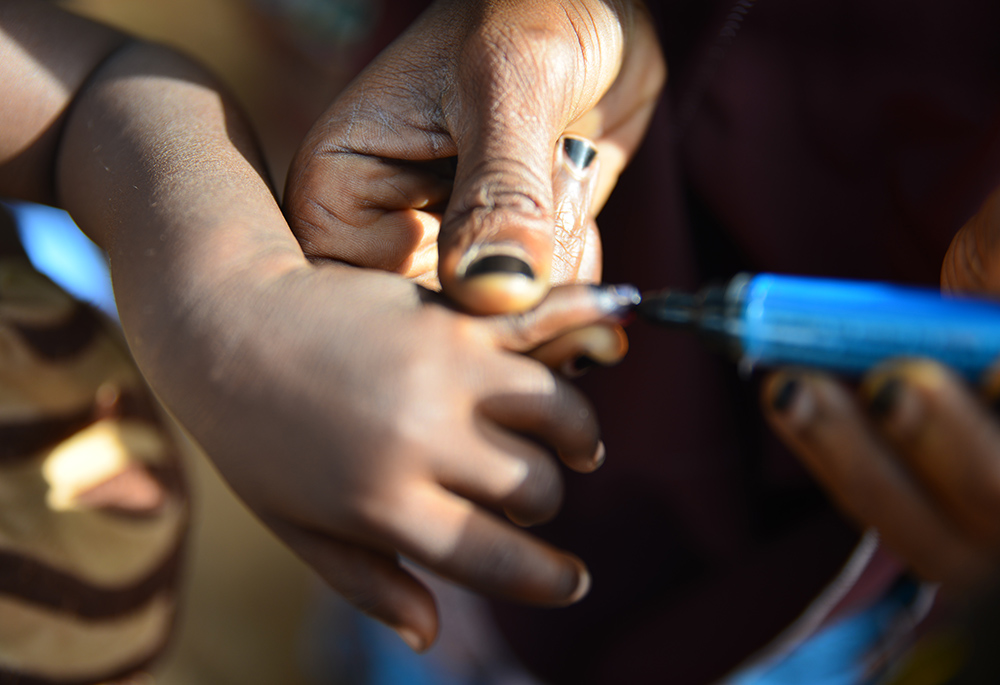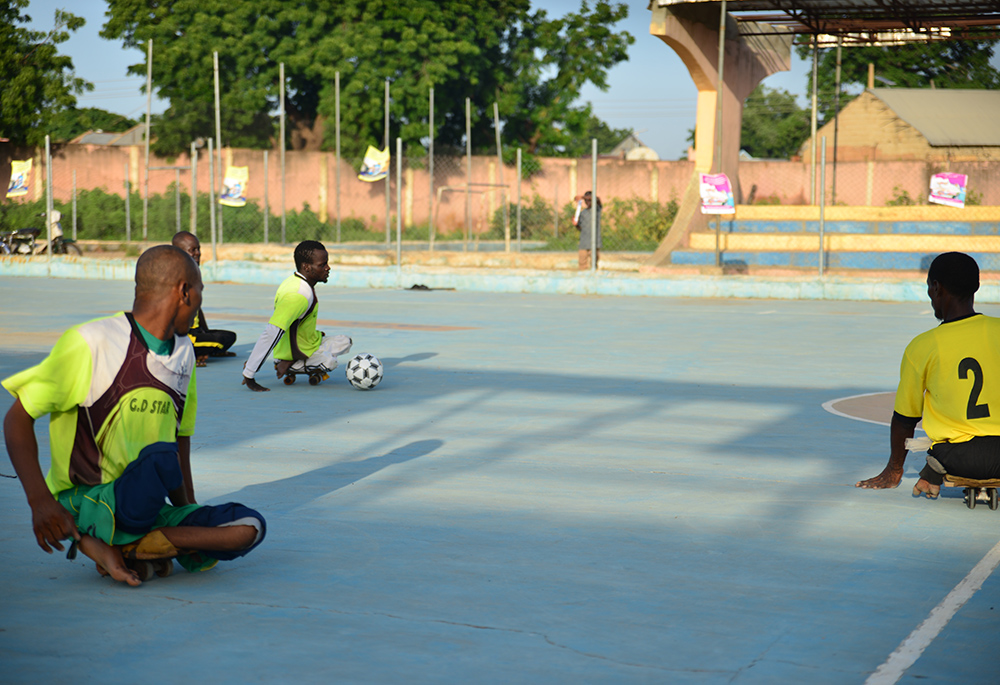
A Nigerian child gets blue ink on her finger to show she has received the polio vaccine. (Patrick Egwu)
Every Sunday after Mass at St. Kevin's Catholic Church in the suburbs of Sokoto, northwestern Nigeria, Fr. Nuhu Iliya and other priests stay around to speak with parishioners about polio: a highly infectious disease caused by a virus that can affect nerves in the spinal cord or brainstem.
Polio mainly affects children under 5 years of age and can cause paralysis in a matter of hours, according to the World Health Organization. The virus is transmitted through contact with an infected person or contaminated water or food.
"We want parents and guardians to be informed so that children can be saved from this deadly disease," said Iliya, pastor of the 400-member parish. "We find joy in doing this because it's still the work of saving lives, an evangelism for us."
Iliya said they also ask community leaders to meet with their members and talk to them about preventing polio. The effort is promoted by international organizations like the World Health Organization, Gavi, an international vaccine alliance, UNICEF, Rotary International and the Bill and Melinda Gates Foundation.
The Global Polio Eradication Initiative lists Pakistan and Afghanistan as endemic countries for polio, and lists Nigeria as one of many outbreak countries. In 2020, Nigeria was declared free of the wild poliovirus, but new variants of the virus remain in circulation and pose health risks to children, especially in rural areas that lack access to clean water and basic sanitation and hygiene facilities such as clean toilets in public spaces. For countries with polio, UNICEF says it is integrating "health, nutrition, education, and water, sanitation and hygiene services into polio vaccination campaigns."
Sokoto, where Iliya works, is one of the states most affected by the new polio variant, recording about 70 cases of the virus between 2023 and 2024, according to data from the state primary health care development agency. The data also shows that more than 1.4 million children have been vaccinated.

Polio survivors participate in a football tournament organized by UNICEF to mark World Polio Day in October 2024. (Patrick Egwu)
The priest also serves as vicar general of the Sokoto Diocese. He told the National Catholic Reporter that the diocese works with sisters and other Catholic groups like Caritas to promote good hygiene practices among parishioners and members of other faiths.
"Once a child is infected, the damage is always irreversible so the best way to prevent it is through health education and promotion," said Sr. Ann An-Iko, executive director of the Catholic health commission and administrator at the Holy Family Mother and Child Clinic and Maternity, owned by the diocese.
"We give vaccines to babies who come for immunization as a way of protecting them," she said. "I do more of the health education targeted at women and telling them about the dangers of polio and how to prevent it."
As the director of health in the diocese, An-Iko visits all the parishes to promote health education, especially at women's meetings and other parish gatherings. She has often visited St. Kevin's parish.
"We want them to protect their children and follow the latest updates about vaccination," the Dominican sister told NCR.
Every Monday, women bring their children younger than 5 years old for routine polio vaccination at the diocesan-run local clinic. An-Iko, who is also a nurse, said she uses the opportunity to incorporate health education and share the importance of immunization for children at an early age and how it can "save families the burden of having children who may not be able to use their limbs properly in the future."
Every Friday when pregnant women come for prenatal care at the clinic, they also receive information about polio, the sister said.
In southeast Nigeria, Fr. Franklin Ugwu, director of St Mary's Hospital in Enugu Ezike, supervises and oversees the hospital's health education program.
He said women who come for prenatal services every Tuesday participate in information sessions about the dangers of polio and the need for vaccinations, which he said some of the women were not aware of.
Iliya and An-Iko told NCR the polio health education programs have had a strong impact with parishioners.
"There has been a reduction in polio cases," An-Iko said. "We see women bringing their children for immunization on their own unlike previously when you had to go to their homes."






